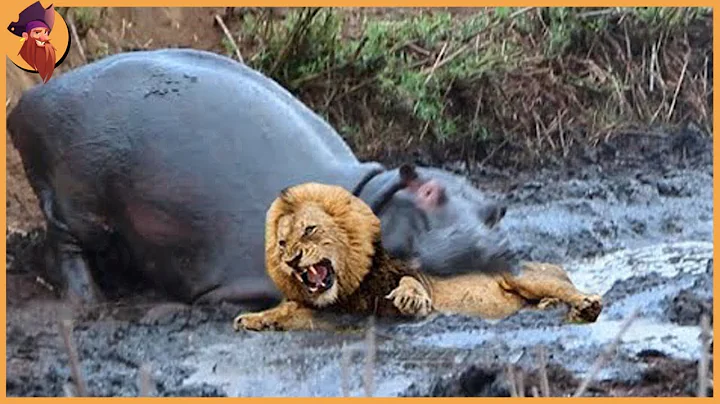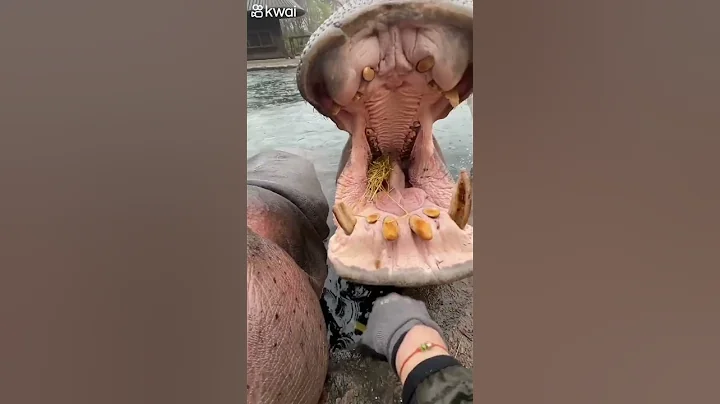Fish suffocated by feces
If you go to the zoo to observe hippos, careful animal keepers and managers will carefully remind you not to stand behind the hippopotamus, especially when the observation environment is semi-open.
It’s not because of any other dangerous reasons, it’s entirely to remind tourists to clean themselves.

Because when the hippopotamus is preparing to defecate , standing behind the hippopotamus is likely to be dumped all over.
This sounds disgusting, right? There may never be a " feces-making machine " like the hippopotamus in nature, and the way of defecation is so unique.

Animal behavior named this behavior of hippos " feces transmission ". When hippos perform this behavior, they will use their tails to rotate quickly and then distribute their feces to a larger area.
A more reasonable explanation is that the hippopotamus does this mainly to declare in territory. On the other hand, occupies in the area to warn other creatures not to approach.
Some people may think about how risky it is to just shake the poop with your tail.
In fact, when you encounter this situation, you should probably stand farther away, because the radius of the hippo's spray-type feces can reach 410 meters .

is not very lethal, but extremely insulting. With this comparison, it may be understandable that your dog urinates everywhere on the roadside telephone pole.
For hippos, , this defecation behavior can also show their strength in some aspects.
Hippos have a strong sense of territory and will usually fight over a shallow water, but before that, hippos will judge each other's behavior. How to judge
? It depends on whether the feces thrown by the opponent is powerful or not. If the feces thrown away are numerous and far away, it is obvious that the opponent has a strong background, so it is best not to attack easily.

Despite this, a group of hippos is still much more harmonious than a single hippo. If a group of hippos share a pool, then the chance of such a fight will be smaller.
But for the fish in the water , it will suffer.
Hippo is a semi-aquatic giant herbivore, weighing up to 1 ton, and mainly forages at night and soaks in the water during the day.
But each hippopotamus can eat 40~50 kilograms of plants in a day. After eating, it will return to the water and continue to soak. The end result is that the more it eats, the more it will poop.

Fish suffocated to death by feces
When scientists were investigating the impact of hippopotamus communities on the natural ecology of Africa, they discovered a very bad thing in Ruaha National Park in central Tanzania .
Every dry season, a large amount of hippo feces will accumulate in the hippo pool.
Such high-density accumulation of feces makes it difficult for the water body to flow. It is not an exaggeration to say that it is a pool of septic tank .
As a result, the river is extremely eutrophic, causing the dissolved oxygen concentration of most fish to drop to sub-lethal levels . The result is the death of a large number of fish.

The pool contaminated by hippo feces
Once it dries up, only a small number of fish and insects can survive in the hippo pool.
Due to the lack of oxygen in the river, most fish will be suffocated to death by hippo feces. Related research on
was later further demonstrated in Yale University . Relevant researchers conducted 3 years of monitoring in Mara River and finally obtained this data survey report.

Hippo pools are like dumplings
Research on hippo excrement
The original intention of the entire experiment was mainly to study the undigested plant material in hippo excrement. In addition, the team also noticed that whenever the river rises due to the rainy season, the banks sometimes There are many dead fish .
researchers have targeted the upstream hippo pool throughout their investigation.
In the 3-year record of the Yale University team in the Mara River, they recorded 55 flushing flows, of which 49 dropped sharply in the concentration changes of the New Mara Bridge downstream of the Hippo Pool.
The main reason is the feces in the hippo pool and the flushing effect of the river.

Data integrated from waterborne drone surveys
The researchers explained in the record that the Mara River has many resident hippos, which release 9.3 tons of excrement into the flowing river every day, That is, plants that are not fully digested.
Because the organic matter and nutrient loading rate in hippo feces are very high, it will lead to hypoxia in the hippo pool.
Occasional high flows, namely heavy rains during the rainy season, will flush chemically stratified bottom water and hippo feces out of the hippo pool.
This deterioration of water quality by hippo feces will then develop further downstream, with flushing flows transporting oxygen-depleted water with high biological oxygen demand downstream through tributaries to the main stream of the Mara River.

Relevant data of dissolved oxygen experiments
As feces is deposited , a large amount of feces is decomposed, and the bacteria that eat these feces will also consume a large amount of oxygen in the water, thus causing the water body to become deoxygenated. Related investigation reports pointed out that microbial activities can produce various chemical substances, such as ammonium, hydrogen sulfide, methane and carbon dioxide, and ammonium and hydrogen sulfide are potentially toxic to fish.

Research members who are conducting simulation experiments
Under normal circumstances , as long as these water bodies stay in the waters of the Hippo Pool, there will not be a big problem, but the flushing water generated by heavy rainfall in the rainy season will take them away.
The sudden influx of this oxygen-poor water will cause the water body to be temporarily deprived of oxygen, and the water body will continue to decompose feces and then continue to consume oxygen.
In the end, the fish was choked to death .

 years of flushing flow records and dead fish
years of flushing flow records and dead fish
Researchers have recorded 13 such events in the Mara River, including 9 hypoxia events that eventually led to large numbers of fish deaths.
Every year, thousands of fish die here due to hippo feces. In addition, a survey in the United States found that the biodiversity of pools during the dry season will be reduced 41%.
Among them, the fish that died the most was tilapia . Even if tilapia could regenerate, it could not escape the "kill" of hippo feces.
For local residents, tilapia is a staple food, and the activities of hippos have more or less adverse effects.

Tilapia expresses its injustice
The changes brought by hippo pools to the ecological environment
However, scientists do not hold a pessimistic view of this behavior of hippos. For the entire ecological environment, The existence of hippo pools is a ecological cycle .
The differential impact on water flow during dry and wet seasons suggests that there is some resilience within the overall system, allowing it to recover after each dry season.

This complex interaction provides food and nutrients to the river ecosystem . As long as intervention can be carried out at the right time, the chronic stress caused by the drying of the river and excess hippo feces can be effectively solved .
Human-driven changes in aquatic invertebrate diversity, Hydrology are now being redefined.

Observation of pools in different periods
For a long time in the past, water body hypoxia and river changes were largely caused by human activities and related impacts.
This discovery has changed scientists' past understanding. Perhaps hippopotamus' impact on ecosystem diversity and function is more complex than currently understood.
For the hippopotamus group, every dry season, they will move their positions and go to find new water sources to live.
Although the problems caused by the accumulation of large amounts of feces will be solved after the next rainy season, it will eventually return to the normal ecology under the influence of the natural environment.

The grassland that is not affected by the hippopotamus group will be cleaned once due to the arrival of the hippos. This cleaning will solve the problem of the grassland's nutritional needs around the water source.
On the one hand, reduces the area of grassland. On the other hand, leaves a lot of chemical fertilizers.
The nutrients brought by hippos will re-change the aquatic community during the rainy season, and begins to decrease again during the dry season. This pressure cycle caused by hippos may also change the entire surrounding ecology in the future.
Scientists believe that human activities and hippo activities will have different changes. As research progresses, this issue may be more fully explained.

Interestingly, because the intestines of baby hippos are sterile, they will also eat their mother's feces like koalas .
The little hippopotamus will also serve as a decomposer at a certain stage, which is very bad for the fish in the river. No matter what they do, they will either be eaten by humans or suffocated to death by hippo feces.
Hippos in Tanzania still exist here today. 4,000 hippos are like a mighty army, wandering around the waters every year.
then prepares the next activity to replace the river ecosystem.





















